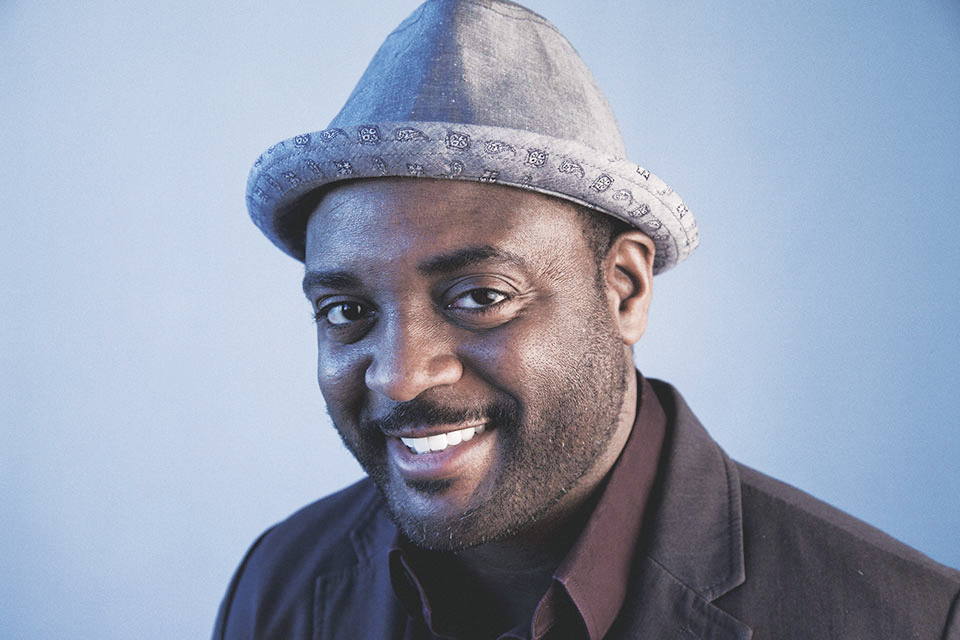
Courtesy of Yale News
On Dec. 7, 1996, Dwayne Betts LAW ’16 GRD ’23 and his friend, found a man asleep in a Washington, D.C. parking lot and carjacked him at gunpoint. At the age of 16, Betts was charged with six different felonies and sentenced to nine years in prison.
After serving eight years behind bars, Betts, now 36, went on to write critically acclaimed poetry, attend Yale Law School and start a family. He worked in the New Haven Public Defender’s Office and passed the Connecticut bar exam this February.
And more than two decades after his conviction, the only thing preventing Betts from practicing law is a letter that came earlier this month from the Connecticut Bar Examining Committee, which denied him admission on the basis that “a record manifesting a significant deficiency in the honesty, trustworthiness, diligence or reliability of an applicant may constitute a basis for denial of admission.”
Betts’ story has attracted national attention and sparked a public debate about the equity of the U.S. criminal justice system. A petition on Change.org started by Leif Dautch ’07, the deputy attorney general at the California Department of Justice, calls for the committee to reconsider its decision. As of Tuesday,the petition had received over 98,000 signatures.
“One of the reasons that Dwayne’s story resonated with so many people across the country is that we as a society are starting to realize that a purely punitive model of criminal justice doesn’t work,” Dautch said. “It’s inhumane, doesn’t promote public safety and costs too much.”
Shon Hopwood, now an appellate lawyer and an associate law professor at Georgetown University Law Center, had a similar trajectory as Betts. Sentenced to 12 years in prison for multiple bank robberies, Hopwood went on to gain a national reputation as a “jailhouse lawyer” after the petitions he prepared for other inmates were granted by the U.S. Supreme Court.
“Nobody has the integrity and fitness to practice law when they are 16 because 16 year olds are not responsible,” said Hopwood, arguing that bar associations should reallocate their resources from character assessments to attorney discipline monitoring.
But for recently released prison inmates, admission to bar is only one of many challenges they face.
Dautch, citing his experience working at the San Francisco Juvenile Probation Commission, said people with criminal histories face tremendous barriers seeking employment, finding a place to live or simply voting at the ballot box. Admitting Betts to the bar would send a message to other people in similar situations that their efforts to change the course of their lives would eventually be rewarded.
Amy Eppler-Epstein LAW ’86, who supervises the New Haven Legal Assistance Reentry Clinic at the Law School, said it shocked her that someone who had made his way to a top law school would still face obstacles toward becoming a lawyer.
Eppler-Epstein, who has worked for over three decades in the Reentry Clinic, said she sees a discrepancy between the decision of the Bar Examining Committee and the Connecticut government’s commitments to establishing a “second chance society,” an initiative Gov. Dannel Malloy announced in February 2015.
Under Malloy’s leadership, Connecticut has legalized medical marijuana, loosened penalties for drug possession and stepped up efforts in supporting reintegration into society.
“The bar needs to follow the lead of our government,” Eppler-Epstein said.
Yet for some, the obstacles that Betts faces raise questions about the legitimacy of character tests for the bar.
Habib Olapade LAW ’20, who heard about Betts multiple times in his later years in college and was shocked when he found out that Betts was not admitted to the bar, argued in an op-ed in the News last week that the committee’s decision to deny Betts admission underscores why the bar should abolish character assessments altogether.
Olapade contended that the test poorly predicts future behavior and disproportionately impacts certain racial groups and socioeconomic classes.
“There is nothing ‘good’ or ‘moral’ about these assessments — and nowhere is this starker than with Yale’s very own Dwayne Betts,” Olapade wrote.
Yet Dautch said he sees the Betts case primarily as the committee’s misjudgment, rather than as evidence for eliminating the standards that the committee uses. In an email to the News, Dautch said that given the significant power admitted attorneys would be able to yield, he is not opposed, in principle, to scrutinizing applicants’ background to ensure that ex-felons are rehabilitated enough to join the legal profession.
Betts is the author of two books of poetry, “Shahid Reads His Own Palm” and “Bastards of the Reagan Era,” and a memoir, “A Question of Freedom: A Memoir of Learning, Survival and Coming of Age in Prison” that won an N.A.A.C.P. Image Award. After his release in 2005, he earned a bachelor’s degree from the University of Maryland, a master’s of fine arts from Warren Wilson College and was a Radcliffe Fellow at Harvard’s Radcliffe Institute of Advanced Studies.
In an interview with the Hartford Courant, Law School Dean Heather Gerken, who taught Betts constitutional law, said he was constantly asking her for extra reading, which is rare in the already reading-intensive environment of law school.
“It was like he was in a different world and was determined to figure it out and master it,” Gerken said.
Betts is currently a Ph.D. candidate in law.
Jingyi Cui | jingyi.cui@yale.edu | @jingyicuii







